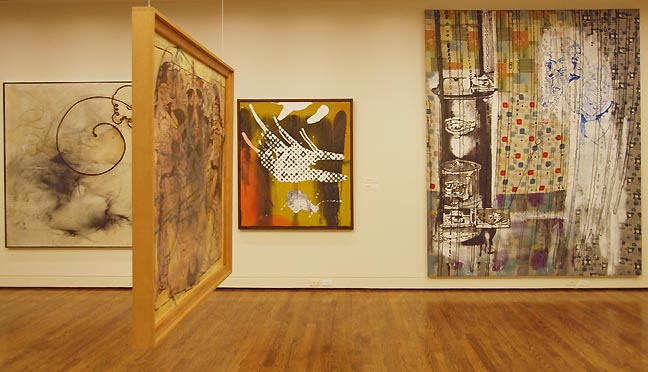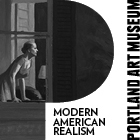
|
||
|
Portland art blog + news + exhibition reviews + galleries + contemporary northwest art
|
||
Thoughts on Sigmar Polke  Works by Sigmar Polke from the Nicolas Berggruen Charitable Trust on display at the Portland Art Museum in 2013 (L to R) Providentia-Schleife (1986), Untitled (1989), Druckfehler (1986), Lumpy Hinter dem Ofen (1983), Untitled (1983), photo Jeff Jahn With the opening of Sigmar Polke's retrospective, Alibis at MoMA, there has been a sudden and massive interest in his work. PAM had a wonderful and very strong exhibition of Polke's work last year (which Victor reviewed), including a couple of key works in the Polke retrospective. Polke's work has always left me conflicted. Back in the 80's and early 90's you couldn't take in a major museum without confronting one or two of his works, each generally very different from the last. It was incongruous work that reveled in its own capricious quality that dealt in the seams of various pastiches while being exhaustively inventive in its general dolor. That wasn't a bad thing. It was a lot like a less hopeful version of Rauschenberg's quilts of material and imagery but suffused with a German cynicism of history that isn't present in the major American work that preceded it, not even in Warhol's? Perhaps it is the way there is always some germanic painter who is touted about in the USA... first Polke, then Kiefer, then Richter, then Kippenberger. But there is something liberating in Polke's work that is missing in the others. All but Kiefer are capricious as well and somehow Polke seems the most rooted in the studio. A ridiculousness that is rooted in the studio rather than history or the politics and persona of the world outside. Polke seemed to say, endurance is the reward of seeming capricousness. Over time and being seen en masse it becomes terribly inventive. It is a bit like a court jester and every move is a kind of joke about the way the world works. Thus, Polke is a painter you never meet head on, every move is a glancing blow and a series of feints. Polke was a painter of retreats, and thus the work always seems to live to fight another day. In the end that describes a painter for the ages. I'll likely never be an outright fan of 20th Century German painters de Jour but Polke is massively influential. He seemed to mock mind of art and painting but by building up an ouvre of such exhaustive quality he seemed to map what was wrong with painting in a way that painters who are more serious (Richter) and less so (Kippenberger) could not. Very few painters are fork's in the road and it is interesting how Polke co-opted Rauschenberg's more Yankee approach and rerouted it again through the perpetual shame ofEurope and Germany in particular. Still, Look at his work and it is very difficult to avoid the fact that about half the painters out there are following in his footsteps in some way. Most have been not nearly as good. Rauschenberg and Warhol showed that there is freedom in pastiche... Polke reveled in the endless slavery to history it creates in the studio. It gave painters a way to deal with the gloom of Painting's omnipresent history and imbedded nationalism and gave it worth... spawning perhaps millions of MFA's. In the face of such effect, respect. Posted by Jeff Jahn on April 11, 2014 at 10:24 | Comments (0) Comments Post a comment Thanks for signing in, . Now you can comment. (sign out)
(If you haven't left a comment here before, you may need to be approved by
the site owner before your comment will appear. Until then, it won't appear
on the entry. Thanks for waiting.)
|
| s p o n s o r s |
 |
 |
 |
 |
 |
 |
 |
 |
 |
 |
 |
 |
 |
 |
 |
 |

|
Site Design: Jennifer Armbrust | • | Site Development: Philippe Blanc & Katherine Bovee | |

